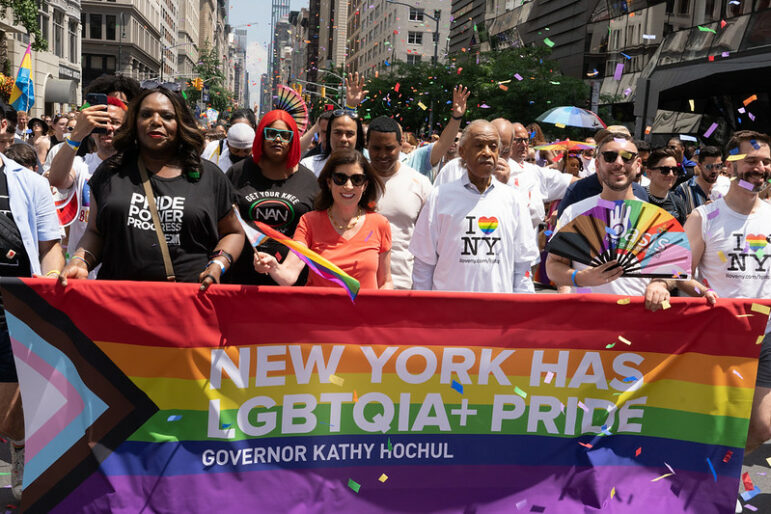“We must not be complacent. People of trans experience in many parts of the country are being targeted for simply being who we are. New York has an opportunity to be a safe haven for the trans community.”

Don Pollard/Office of Governor Kathy Hochul
Gov. Hochul signed legislation to protect and affirm the LGBTQ+ community ahead of her participation in New York City’s annual Pride March.At 13 years old, I knew I was transgender. I was a girl, and yet the person I saw in the mirror did not reflect who I was inside.
Although I was ready to accept myself, my family and community were not. As a young mixed-race Asian and Black transgender teen growing up in Virginia, I was beaten up and attacked for being who I was. Transphobia was part of my everyday life. I knew that if I could get gender-affirming surgery, I would be physically safer, and finally, my body would reflect who I was.
The only problem? Gender-affirming care did not exist for me. Growing up in urban Virginia 20 years ago, no doctors had expertise in gender-affirming care. So instead of going to a safe, licensed healthcare provider to get the care I needed, I turned to unlicensed care.
My experience is not unique. Transgender people, especially youth, often face discrimination from medical providers and harassment in healthcare settings. When we do find providers, they often know very little about trans health care, and we have to educate them about what we need.
And now we’re facing more barriers as lawmakers across the country have introduced hundreds of bills that target transgender and non-binary youth’s access to age-appropriate, medically-necessary care.
My story is a warning about what can happen when people lack access to the care they need. Throughout my young adult life, I underwent over 20 surgeries to alter my appearance, including breast implants in Mexico. Because of the immense barriers to accessing gender-affirming care at home, I received many of my surgeries internationally and paid for all of them out of pocket.
A decade after my initial procedures, I became sick. I went to the hospital, where a team of doctors could not figure out what was wrong with me. My health was deteriorating fast.
That all changed a few years ago when I became a member of Amida Care, a nonprofit health plan in New York that provides tailored care to communities impacted by HIV, including LGBTQ communities, and specializes in trans health. This Medicaid Special Needs Health Plan helped me secure the gender-affirming and ultimately life-saving health care I needed. They connected me with a doctor who discovered that my breast implants were ruptured and leaking toxic, cancerous substances causing my illness. The doctor also found that if the original silicone injections in my hips, which were causing me excruciating pain, were not removed, it would cause life-threatening problems. For the first time, I felt understood by a medical professional.
I was lucky. While other states are restricting gender-affirming care, in New York State, Medicaid Special Needs Health Plans work closely with culturally competent providers to provide access to high-quality care. Much of my progress toward a healthier life is because my health plan connected me to gender-affirming care along with primary care, mental health supports, and sexual health services like PrEP so that I can stay HIV-negative. Amida Care’s clinical standards align with the World Professional Association for Transgender Health standards of care, cover gender-affirming surgeries, and work with an expansive network of providers with experience caring for transgender, gender-nonconforming or non-binary (TGNCNB) patients.
But it should not have taken me decades to get the care I finally needed. Where would I be if I had access to gender-affirming care when I was young? I nearly lost my life as a result of inadequate care. Young TGNCNB people may face the same risks today as a result of the wave of anti-trans legislation taking hold nationwide. It’s a mistake for New Yorkers to think these actions in other states won’t impact us, too. New York is taking steps to safeguard trans care by passing legislation to end discrimination and protect transgender youth, their families and providers from prosecution for seeking necessary care.
This past legislative session, I joined advocates in Albany to successfully lobby the state legislature to pass the New York Safe Haven for Transgender Youth and Families legislation, introduced by Senator Hoylman-Sigal and Assembly Member Bronson. Thanks to our advocacy, the bill passed the legislature and was recently signed into law by the governor. This legislation is a crucial step in making New York a sanctuary state by safeguarding transgender youth from out-of-state laws prohibiting their families from determining their child’s need for gender-affirming care.
New York should continue being a leader, and the next legislative session pass the Transgender and Gender Non-Conforming Non-Binary Anti-Discrimination Requirements in Schools Bill, introduced by Senator Hoylman-Sigal and Assembly Member Simone, which would ensure that schools treat students consistent with their gender identities or expressions. Next year, New York voters will also have the opportunity to pass the Equality Amendment, which will add protections for sexual orientation and gender identity to the state constitution.
We must not be complacent. People of trans experience in many parts of the country are being targeted for simply being who we are. New York has an opportunity to be a safe haven for the trans community. Thank you to the governor for signing the New York Safe Haven for Transgender Youth and Families legislation into law. Gender-affirming care saved my life. It should be accessible to everyone who needs it.
Shauna Brooks is an activist, model, and actress.








